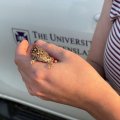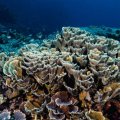One of Australia's most respected marine scientists, former University of Queensland reader Dr Robert Endean, was on Heron Island - the launching pad for much of his research - when he had a heart attack which led to his death on October 6. He was aged 71.
He was due to deliver a key note address to the national meeting of the Australian Coral Reef Society.
Dr Endean, an outspoken advocate for protection of the Great Barrier Reef, worked in the University's Zoology Department for 40 years until his retirement in 1990.
He was best-known for his research into toxicology of marine organisms, particularly the crown-of-thorns starfish, acanthaster planci.
Dr Endean was instrumental in instigating an environmental protection movement, leading to the formation of the Great Barrier Reef Marine Park Authority.
Associate Professor Jack Greenwood, a former colleague of Dr Endean's for 35 years, said Dr Endean was on of Australia's leaders in marine science and ecotoxicology.
'Bob was a pioneering soul in recognising the significance of the crown-of-thorns to coral ecology, agitating in the scientific literature and through the media that the crown-of-thorns was a major cyclical phenomenon with potential to impact adversely on corals,' Assoc Professor Greenwood said.
'Bob alerted science as well as the community to the fact that the crown-of-thorns was and is a threat to the Reef.
'He was also at the forefront of moves in the 1960s and onwards to look for biologically active compounds for use in medicine. He was instrumental in getting Roche Laboratories working with the University to isolate many active compounds, some of which have had medical importance.
'Through this association, Roche built a laboratory on Heron Island which is now the research laboratory that forms a part of what is now the University's Heron Island Research Station (HIRS).
He described Dr Endean as 'strong and visionary - someone who was prepared to stand out from the crowd and defend his beliefs'.
'He was known to generations of students as an entertaining and stimulating lecturer,' Assoc. Professor Greenwood said.
'At the time of his recent illness, two of the medicos who attended him at Heron Island had been students of his many years ago, and still remembered the first lecture he had given them.'
Vice-Chancellor Professor John Hay said Dr Endean was a most respected research scientist who would be missed by former colleagues, students and friends.
'At times outspoken and controversial, he was nevertheless a passionate protagonist for the survival of the Great Barrier Reef, and his influence at committee and conference level was widespread and compelling,' Professor Hay said.
Dr Endean was variously secretary, chair and president of the Great Barrier Reef Research Committee from 1954-75 and a consultant to Roche Pharmaceuticals.
He was a member of the World Health Organisation's Expert Advisory Committee on Food Additives, due to his knowledge of the toxins elaborated by animals and plants.
He was also deputy chair of the Heron Island Board, responsible for operating HIRS.
He had advised Queensland police, and government and medical authorities on several occasions about toxins and marine biology.
He graduated bachelor and master of science with first class honours in Zoology from the University of Sydney, and a PhD from the University of Queensland in 1958.
He is survived by his partner Dr Ann Cameron of the Zoology Department and his daughter Coralie.
A memorial service was held for Dr Endean was held by the University lake at St Lucia on October 15.
For more information contact Assoc. Prof. Greenwood on telephone 07 3365 2504.


